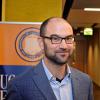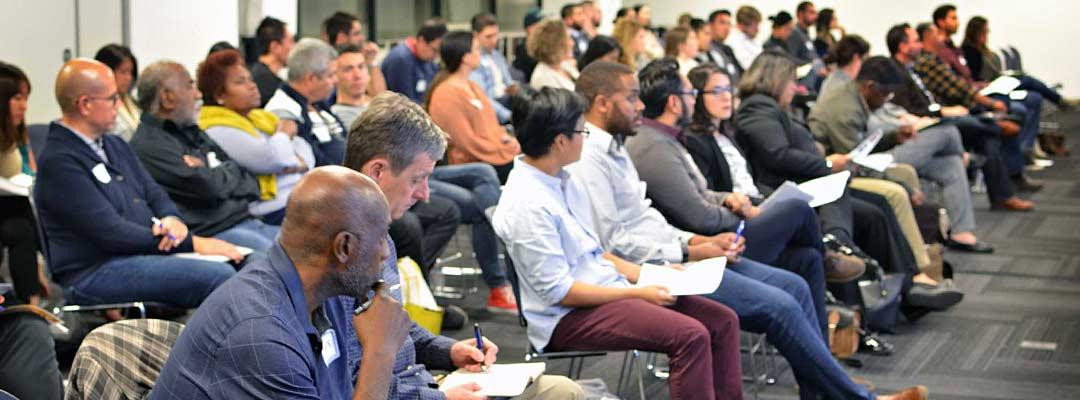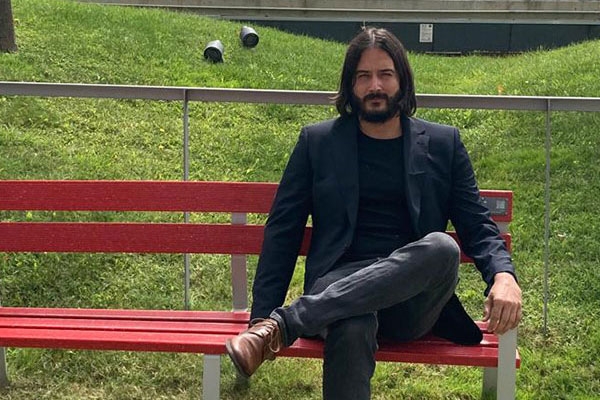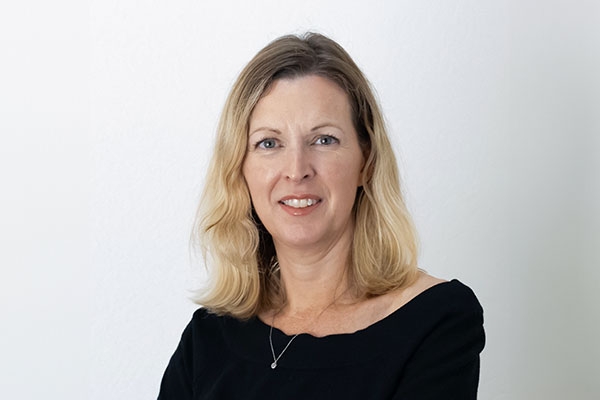On Wednesday, Nov. 7, prospective and current project management students arrived at our San Francisco campus ready to hear from certificate alumni, instructors and working professionals. The panel was led by program director Tim Bombosch.
Whether it was explaining the role of change management, the rise of Agile management or why everyone already possesses some sort of project management skills, the night saw lively discussions and successful networking.
But first, meet our panelists:
Eleanor Portacio Abea, 2017 graduate

Program Project Coordinator of Sustainability, Energy and Resource Management at Stanford Health Care
Eleanor is responsible for administrative business operations, managing small projects, project schedules, resource loading and leveling within a larger master schedule. She enjoys working with transition-resistant teams on process improvement, increasing efficiency and implementing organizational changes.
Donna Carter, PMP, current student

Senior Administrative Assistant at Genentech
Donna is 2 units away from completing the Project Management certificate and passed the PMP® Exam in August. In addition to her current work, Donna also has a private practice as a nonviolent communication counselor and somatic-experiencing professional helping people resolve stress and trauma in their nervous systems.
Ronald Gerola, PMP, Project Schedule and Risk Management instructor

Associate Director at Cognizant Technology Solutions
Ronald is a certified Program Management practitioner, consultant and accomplished instructor with extensive industrial experience leading project teams through Asia/Pacific, Europe, Middle East and North America. Holding multiple certifications and licensed as a professional engineering in multiple states, Ronald’s recent projects include initiatives at Comcast, Symantec, Hewlett-Packard, Veritas, Agilent, Toyota and MGM Resorts International.
Sandra Lew, PMP, CSM (Certified Scrum Master), Prosci Certified Change Manager, 2014 graduate

Senior Program Manager at Ubisoft
Sandra is a project management expert who partners with executives and team leads to increase operational efficiencies and productivity. Sandra has driven numerous global programs to launch events, tools and organizational changes in the videogame and broader tech sphere.
Lifong Liu, PMP, Project Execution and Control instructor

Managing Director at Global Focus Innovation
Lifong is a chemical engineer who has managed large-scale IT system projects, oil refineries, chemical plants, environmental remediation, geothermal power plants, pharmaceutical facilities, construction projects and office headquarters, with budgets ranging from $10 million to $720 million. She consults with company executives across a range of industries in North America and Asia to help them cope with technology disruption, dramatic change and market uncertainty.
Dave Pendorf

VP of Business Operations at Planisware
Dave is responsible for implementing the company’s strategic vision in order to drive top-line revenue growth while maximizing the bottom line. His roles include implementing cross-functional projects, analyst relations, sales and marketing enablement and providing the voice of Planisware at their largest global events. Planisware is a global provider of project portfolio–management software solutions for product development organizations. Or, as Dave describes it, “Microsoft Project on steroids.”
The more project managers can speak to change management, the better you are going to be in your candidacy or your execution.—Dave Pendorf
What is change management?
Sandra Lew: With different processes or systems in an organization, there comes a need for change. You have to find ways for different departments to work together and find solutions for those changes. They need somebody who rallies them together, and that’s my role. One of the secrets is that you need to find ways to relate to both or multiple sides that are involved in any process change—being able to communicate with them on their level, understanding what their role is in the process and then being able to make that change and sustain it past the initial change. There’s always resistance to change, too. It’s a huge challenge, but it’s rewarding when it’s done.
Tim Bombosch: One of the things that’s happening in project management today is that it’s more than just delivering a new technology system, a new process, a new product. Especially for internal projects that you do on behalf of your company or your customer, adoption means a lot. Project managers are getting more involved in that adoption piece that happens after the development and delivery of the system.
Dave Pendorf: I wholeheartedly agree that the more project managers can speak to change management, the better you are going to be in your candidacy or your execution. It could be a differentiator for you in the marketplace.
Is everyone a project manager?
Ronald Gerola: Project management is a combination of hard skills and people skills. The good news is that regardless of how many years you’ve done project management, we’re all project managers at heart. We all do projects. You have personal projects—home remodels, changing your career, getting a job, even finding your mate! [laughs] You have requirements, you have success criteria and a cost. That dovetails into project management. You probably know more than you think you do about the ideas of project management. A curriculum like this fills in the holes or gaps in your knowledge and gives what you already know formal names. One of the hallmarks of a profession is the uniform use of terminology and standards and methodologies. Thankfully, we have methodologies that are adopted globally—the PMBOK® (Project Management Body of Knowledge).
I 100-percent applied skills to my current job that I learned in the certificate.—Sandra Lew
How did you decide that you were going to pursue the Project Management Professional (PMP®) certification, how did that impact your career and what’s the difference between getting a certificate from us and getting the PMP®?
Sandra: The PMP® is part of the PMI® certification; PMI® is a governing body. The PMP® is basically a way of having public professional certification. The UC Berkeley Extension certificate was a means of getting there. So when I knew I wanted to pivot into project management specifically, I didn’t have a lot of formal training or official roles that had project management tied to it. I just had miscellaneous things where I was doing project management functions. I knew I wanted a formal education to understand project management as a baseline and then use that as a step to achieve my PMP®. It would have been significantly more difficult to pass the PMP® without the certificate. The certificate gives you the backbone and knowledge as opposed to just studying to pass a test. I 100-percent applied skills to my current job that I learned in the certificate.
Ronald: This program gives you a very good basis to have a high success of passing. I’m not going to say that it’s easy, but with the courses in the certificate, you’re positioned better than other academic programs that I’m aware of. You want to obtain the PMP® certification if you are serious about your career in project management because it looks great on LinkedIn and on your résumé. It’s certainly the icing on the cake—the validation of your skills and success as a project manager.
What was your first job or what was it like to get your first job?
Lifong Liu: Let me address how the career of a subject matter expert (SME) transitions into project management, into senior management, into whatever career vision you have. I worked as a chemical engineer and I was a project manager, I just didn’t know it. How? Because people would ask me about where to find something, how to do something. You now begin to function as a project leader because you are a subject matter expert and you provide coordination and information. So you take away obstacles for other people. As a result, when they have a problem on their project, they come knocking at your door for your help. That’s the next step. You keep doing your job until they give you a project manager title—now you’re in trouble. [laughs] You don’t know about risk management, cost analysis, et cetera. Now you’ve stumbled into a project management role. So don’t overlook these opportunities. One of the characteristics that you’ll discover in yourself is that you love learning. You like solving problems. You take initiative. Those are the true characteristics of a good manager, not just a project manager.
Dave: The concept of being a SME first in project management—awesome. If you’re not a SME, you can’t just become a SME. My observation of good project managers are folks who go the extra mile, they get involved in the project, they do some of the little things. If something slips through the cracks, they pick it up. So you need to have an interest. Are you someone who has apps on your phone? IT needs project managers. Are you someone who likes to do home projects? There’s plenty of construction engineering project management jobs. When you’re looking at where you want to market yourself, look at what you do in your free time and you’ll be a better project manager because you’re going to care so much about whatever it is that you’re working on. That will help accelerate your career.
Donna Carter: I’m an administrator at Genentech and they paid for my certificate. They see me as an administrator but I pushed to be on a project where we brought in portfolio teams from Europe and our local teams and had a summit. Once I got on the project, I knew the vernacular and the processes and stepped up, and said, “What are our action items, what are our minutes, what should be on our next agenda?” I brought what I learned from the program—the structure—and started to get respect for it. And they started to entrust me with more and more of the process: the requirements to the logistical and subject matter expert items. I’m still an administrator, but I have the PMP®. So my boss came to me, and said, “Donna, I’ve got this part-time, 20-percent opportunity for you to be a project manager.” That means he’s going to give me the title for 20 percent of the time, but that’s how it worked for me.
Agile is the future.—Dave Pendorf
What is Agile management?
Sandra: In general, there are different methodologies to approaching project management. PMBOK® and PMI® are a very specific methodology with structure and specific steps. Agile is also a recognized project management methodology. Its hallmark is iteration, fast repetitions, Scrums.
Lifong: If you have a project where there are a lot of unknowns, then you would go Agile. If you have access to the product managers or product representative who will be able to give you insight and guide you on the decision of whether this function or feature is good, then you are in a good position to use Agile.
Donna: There’s something called the Agile Manifesto and one of the points is an outgrowth of trying to counter traditional waterfall project management, which means you should specify everything upfront. You’re planning for a long time. One of Agile’s four tenets is people over process, meaning that you want to be more responsive, quicker. Essentially, instead of building a whole elephant, you say I think we want an elephant. Let’s start with the most important thing, which is the trunk. Let’s get together and specify what we need to get a trunk and build a complete working trunk. And then once we get that trunk in play, then let’s decide that we need a tail next. It’s this iterative process of producing something. Build it as you go in small development steps.
Ronald: You see the trade-off there, because for an Agile project there’s more unknowns and it’s harder to estimate the total job that you’re getting into. A lot of organizations with budgets say, “We have a cap on what we can spend.” Agile is a very good and interesting methodology that has to be used in places where that mentality is adopted. Change management helps change that mentality. For some projects, if I tried to plan everything out from beginning to end—every step for a three-year project with thousands of people—who am I kidding? Do I really know all of the unknowns right now so that I can plan out the next three years what these thousands of people are going to be doing? I would be foolhardy to do a project like that in waterfall fashion. So Agile provides us with another opportunity to successfully manage the project in a different way.
Dave: Agile is the future. I am a pessimistic guy by nature, and Agile has been the future for the past couple of years and I have hesitated to believe it. But I just met with a VP of IT at a Top 25 organization and they’re one of our customers. He told me starting January 1 for IT projects, there will not be a single project that he approves that is not planned in Agile. He probably manages a $5 billion budget in IT. You need to know both PMBOK® and Agile because Agile is not quite there yet, but I would strongly recommend anyone to take that Agile elective and strongly consider to take those two additional courses, because in five years or less you may work at a company that does zero waterfall. I talk to analysts who give advice to their customers on what software to purchase and all they ask me is what can your software do in Agile? That’s all they’re hearing from the CIOs who will be implementing the software.
Sandra: From my experience, there are two types of companies: Companies that have really defined project management, PMOs, roles specific to project management, and then every other company. The reality is there will be very formal education that you take away from the certificate, but when you get out there and you’re working for different companies, some of them will be absolutely following Agile or waterfall. In my experience, the majority will not, and part of your role is as an educator and advocate for project management as a whole. For me, I work at a videogame company in a business office. I’m building the business-side PMO, which is very exciting but also telling a bunch of people who have never formally done project management to agree on what to call something in regards to terminology. You will need expertise and understanding of both waterfall and Agile and be able to jump back and forth between them because they often cross-over.
Project management skills can be applied to any field. And what you’re taking away after the certificate is the framework and the knowledge of how to be a project manager.—Sandra Lew
I don’t have the project management title, but a lot of things I do involves project management. What is the value of the certificate?
Lifong: You need to be able to translate what you do every day—in terms of each task—into a project management context, whether it’s traditional project management or Agile management. If you take this certificate, everything will be revealed to you: “Oh, I’ve done that.” “Oh, that’s what they call it.” Project management has technical skills that you have to learn to be professional.
Donna: If you’re doing project management, you’re in business ops. You’re not coming from construction or IT. Business ops is rife; it’s full of project management process, such as dealing with stakeholders. Know how to map it to the terminology in the industry. Once you take a course, you’ll start to see that you already do this.
Sandra: On a related note, one consideration for project management as a specialty is it is field-agnostic. Project management skills can be applied to any field. And what you’re taking away after the certificate is the framework and the knowledge of how to be a project manager, and then you go to different industry that you may not have experience with yourself—you are not the subject matter expert—but you’re applying to do the organization and project management. It’s what makes project management a very versatile and lucrative specialty: You can take those skills anywhere, even if you don’t ultimately end up in a project management role.
Be flexible because you can have an idea that a project is going to go one way and then it may completely switch directions and you have to be able to react to that and then lead the team in that new direction.—Eleanor Portacio Abea
Are there specific traits to be a good project manager?
Lifong: You want to learn new things. You have to be a good listener. You have to suspend your current belief and temporarily accept the stakeholders’ belief until it makes sense.
Sandra: If you feel you’re the kind of person who always wants to have your way, that’s going to be very difficult for you because you’re going to have to objectively look at things and take them at face value. You have to work with your teams to accomplish your goals. Also, don’t let perceptions of what people feel are the right personality types prevent you from pursuing this type of work. I am naturally introverted, which can be challenging for a program manager; however, it’s not insurmountable and you learn as you go.
Ronald: You need to be a little bit thick-skinned because you are a throat to choke, an escalation point. That’s one of the reasons why they hired you: to take the flack or the credit—whatever’s necessary to move forward. Someone has to accept responsibility for actions that they may not be able to control all of the time. For sensitive individuals who might be hurt by slight criticism here and there, you’ll want to think about that.
Eleanor Portacio Abea: You have to be very organized because you’re responsible for other people’s schedules and sticking to the project schedule. Also, be flexible because you can have an idea that a project is going to go one way and then it may completely switch directions and you have to be able to react to that and then lead the team in that new direction.
Donna: If you’re not a transparent person or you don’t value transparency, then I feel that I don’t want you as my project manager. If you can’t delegate and empower and trust the team to do things, then you’re probably not going to be very successful.



